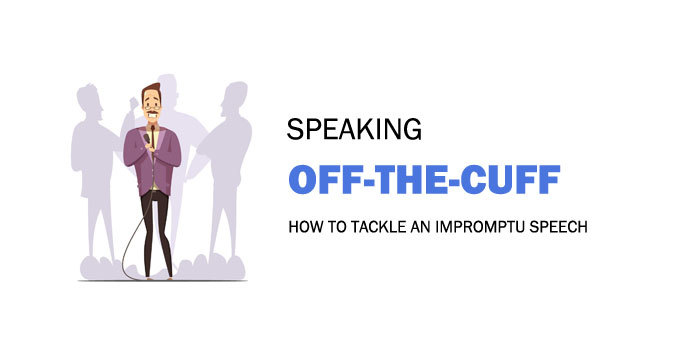

Imagine you are at your best friend’s wedding and you are sitting at the table just enjoying the food and company.
You’re relaxed, and perhaps a little buzzed.
Then the emcee of the event (being weak at impromptu speaking) calls you.
“Why don’t you share a few words about your best friend, John?”
You look around. There are 30 tables and each table has 10 guests. 300 people. Oh oh.
Your heart starts pounding fast, you begin sweating and you start thinking of an excuse. But everyone starts clapping and cheering you on.
The emcee walks to you and passes you the microphone. The spotlight is on you.
What would you do?
Do you run away? Or do you take the mic and possibly embarrass yourself?
Wouldn’t you wish you had learnt to do impromptu speaking?

Impromptu speaking is an essential skill because there are so many situations where you may be called up to speak without preparation.
Here are some examples. Try to see if any of these sounds familiar:
These situations happen more often than you think.
Everyone can give a prepared speech well, but it is how you handle yourself when you are the least prepared, that demonstrates your confidence and leadership ability.
So what do you do when you find yourself in any of these situations?

Before you land yourself in the spotlight, try to anticipate situations where you may be called up to speak.
For example, when you attend a training workshop, the trainer very likely will ask participants to share what they have learnt.
Similarly, when you attend a close friend’s wedding, you may be tempted to give a toast to your buddy.
Or when your team member is presenting a project, and even though you may not be scheduled to speak, there is a reasonable chance you will end up on stage as well.

Before the event starts, take out your phone and make a note of the possible questions you may be asked. Then answer these questions.
It is like preparing a Q&A session after your presentation; you predict the questions that may be asked. Even if the questions are not the same, being mentally prepared to get called up will help calm your nerves and think on your feet.
When you get called up to speak, don’t panic. Rushing up will make you feel more anxious.
Instead, slow down your movements. Take your time. Breathe deep. Get up from your seat slowly.
As you walk to the stage (slowly), use that time to think about what to say. The longer you take to walk up, the more time you have to organize your thoughts.
Slow, controlled movements also signals your confidence. Nervous people fidget, confident people move calmly.
Once you’re on stage, or after you receive your question, pause.
Don’t underestimate the power of the pause.
Pausing not only allows you to organize your thoughts, it lets the audience contemplate the question and form their own thoughts on the subject matter.

Pausing signifies confidence, because only confident speakers do not fear silence. Unconfident speakers think it will be awkward, and it shows through their sub-communications.
Pausing boosts your credibility because it shows you have thought your answer through.
Pausing also ensures that the first few words you utter are not filler words like “umm, well, err…”
Remember, time always seems to appear slower for you - the speaker. What might feel like an eternity for you seldom feel the same to the audience.
Like any speech, prepared or otherwise, an impromptu speech should have a clear structure. This ensures that your audience can follow along easily.
I often see new speakers answer a question directly, somehow forgetting everything they have learnt about crafting a speech.
At the very least, there should be an introduction, a body and a conclusion.
The introduction serves to capture the audiences’ attention. It also sets the context of the speech. It could also be as simple as repeating/rephrasing the question asked.
The body is for your main points. Ideally, 1-3 points depending on the time allowed. To beef up the main body of your speech, back up the points with some anecdotes, examples or statistics.
Anything more than 3 points and you might lose your audiences’ attention. Keep your speech concise, clear, relevant and try not to be too long-winded.
The conclusion is a recapping of your points, answering of the question, sharing of your main message or a Call-to-Action.
Often, speakers miss the conclusion and end their speech with a very weak “yeah, that is all.”